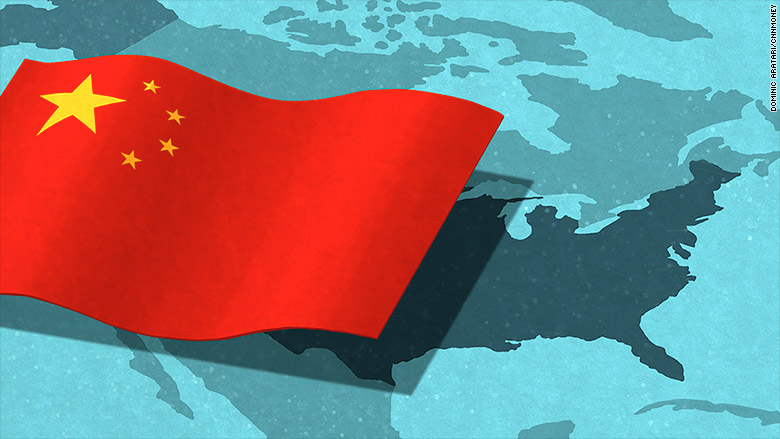China's economy is getting sick. Will it infect America?

China's economy is at risk of catching a nasty flu -- and infecting the rest of the world in the process.
After years of explosive expansion, China is cooling off. Growth has fallen to its lowest level since 2009, and investors believe it might be even worse because Beijing may be fudging the official numbers.
China is now the second biggest economy in the world. The fear is that China will pull other major economies -- including the U.S. -- down with it. That would be scary given how slowly the global economy is currently growing and how little ammo governments have left to jump start business.
"We need all the growth we can get. A slowdown in China wouldn't help," said David Joy, chief market strategist at Ameriprise Financial.
Investors around the world went on high alert when China's stock market began to crumble in late June and early July. While Chinese equities have stabilized for now, it's rattled investors, causing prices for oil, gold and copper to tumble.
Here are the main ways that China's economic turbulence could wash ashore in the U.S.
1. Trade slowdown: Foreign trade is the most direct link between the U.S. and China. Over the next two years, U.S.-China trade is projected to surpass U.S.-Canada trade as the largest in the world, according to State Street Global Advisors.
But if China slows drastically, it will lose its appetite for foreign products, including those made in America.
The good news is the American economy isn't really powered by foreign trade. Exports make up just 13% of GDP, while consumer spending accounts for more than two-thirds. That means as long as consumers aren't too spooked to spend, the U.S. economy should be able to weather the storm.
"We are more insulated than other countries. If China catches a flu, we could get a case of the sniffles," said Kristina Hooper, U.S. investment strategist at Allianz Global Advisors.
2. American business hit: Pockets of the U.S. stock market are exposed to China's troubles. That's because 40% of the revenue generated by S&P 500 companies comes from overseas.
A faster deceleration of growth in China would disproportionately hurt multinational companies. Just last week, United Technologies (UTX) dimmed its 2015 outlook and pinned the blame on China. The manufacturer said new equipment orders at its Otis elevator business experienced a 10% tumble last quarter in China alone.
"The slowdown in China is worse than we had expected," Akhil Johri, chief financial officer at United Technologies, told analysts during a conference call.
American stocks fell sharply last week. The Dow took its biggest weekly hit since January, falling nearly 3%, partly on concerns about a slowing Asia.
Yet overall, corporate executives aren't freaking out about China this earnings season. It's a source of concern, but few CEOs are really sounding the alarm. Some companies -- like Apple (AAPL, Tech30) and Nike (NKE) -- say they are doing great in China.
Investors should listen closely as companies with significant exposure to China detail their latest quarterly numbers. This week's earnings list includes American Express (AXP), Corning (GLW), DuPont (DD), Ford (F), Goodyear (GT), MasterCard (MA), Mondelez Internationa (MDLZ)l, Procter & Gamble (PG) and UPS (UPS).
Another key will be to see if the Federal Reserve is worried enough about China to delay an interest rate hike. That seems unlikely at this point, but the central bank will give new clues when it wraps up a two-day meeting on Wednesday.
3. China's coming financial crisis? China's economic growth has partially been fueled by an explosion of debt. Now that its economy is slowing, there are concerns about toxic loans could trigger a financial crisis there that could spread around the globe -- much like what happened in 2008 with bad U.S. mortgages.
"A financial panic...could potentially plunge the world into recession, particularly if it spread throughout Asia," said George Hoguet, global investment strategist at State Street Global Advisors.
But Hoguet believes Beijing will step in before that happens. China's government has a massive cash hoard of $4 trillion. It has already spent heavily to stop the country's stock market plunge, and it's central bank has aggressively lowered interest rates to aid the economy.
Many Chinese banks are also owned by the government, which limits the spillover effect to other countries and investors.
"They are a command-control society. If they say this loan is going to survive, then they are going to see that the loan survives," said Mark Luschini, chief investment strategist at Janney Capital Markets.
Chilling effect: Even if China's problems stay mostly within its own borders, it's clear the turmoil has changed the way investors look at the country.
Chinese equities skyrocketed 150% during the 12 months before June 12. Then they crashed by 32%, spooking investors who feared it was a signal of deeper economic trouble. The run up in Chinese stocks was fueled by debt, heavy speculation and state-run media promoting stock buying.
Regulators in China rushed to save the stock market. They rolled out a series of heavy-handed moves that helped stabilize financial markets. However, those aggressive actions may have a chilling effect on investors who had hoped Beijing was making its markets more free.
"They had no problem allowing the market to run up. Only when prices began to fall did they rush to the rescue of it. You can't have it both ways," said Joy.
No comments:
Post a Comment